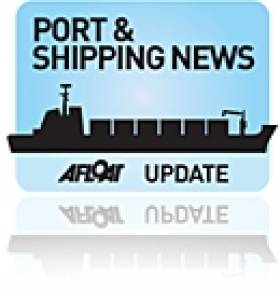Displaying items by tag: Vessel Volvo Village
Ports & Shipping Review. Cargoships, WFSVs, Cork Ferry, IMERC, Dutch Navy & Last H&W Ferry Sold
#PORTS & SHIPPING REVIEW - Over the last fortnight Jehan Ashmore reports from the shipping scene which saw a 'Pop-Up Village' delivered by cargoship to Galway Port in readiness for the Volvo Ocean Race festival which started yesterday and continues to 8 July.
Arklow Marine Services second wind-farm support vessel (WFSV) Gardian 10 was launched for UK owners and today the vessel travelled from Arklow to Belfast Port and berthed at the Abercorn Basin.
In the rebel county, efforts to revive the Cork-Swansea route took a new step when a group was formed to ascess the feasibility in re-launching the Celtic Sea link that closed last November after Fastnet Line went into examinership.
At the Taoiseach's Public Service Excellence Awards, the Irish Maritime Energy Research Centre (IMERC) based in Haulbowline, Cork Harbour, won an award which was presented by Minister for Justice Alan Shatter T.D. at a ceremony held in Dublin Castle.
Across the world the International Maritime Organisation (IMO) highlighted the Day of the Seafarer on 25 June, where the role of those who work on ships provide a vital service in transporting essential goods on a global scale to meet our needs on a daily basis.
Dublin Port welcomed a flotilla from the Royal Netherlands Navy this weekend, where two of the vessels including a torpedo-training ship HNMLS Mercuur (A 900) was open to the public.
Today the cruiseship Saga Sapphire made her maiden 'Irish' port of call to Cobh having entered service in March for UK based operator Saga Cruises. The 706-passenger capacity ship is due to dock at Dublin Port tomorrow morning.
Former North Channel ferry stalwart Stena Caledonia which operated on the Larne/Belfast-Stranraer routes since 1990 has been sold by Stena Line to ASDP Ferry of Indonesia. She is the last ever passenger ship to have been built by Harland & Wolff shipyard in Belfast.
























































